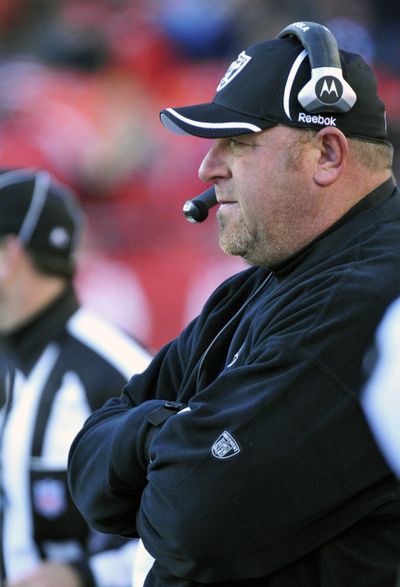Carroll explains why he switched offensive line coach
He says firing coordinator necessary for change he desires

RENTON, Wash. – Sorry, got to run.
That was essentially Pete Carroll’s message Wednesday as he explained the staff changes headlined by the firing of offensive coordinator Jeremy Bates and hiring of Tom Cable to coach the offensive line.
“This is one of the things that I had to do to get us back on track,” he said.
The Seahawks ended the season with a starting quarterback unsigned for next year, and yet two days after the season ended, that wasn’t Seattle’s most pressing question. It was the direction of this offense. And as Carroll explained the decision, he went back all the way to the week before the season began when offensive line coach Alex Gibbs retired.
Seattle lost a saltiness it never rediscovered in its rushing offense. The Seahawks finished the season with the second-worst rushing offense in the league and failed to have a player rush for 100 yards in any regular-season game for the first time since 1982.
Now comes Cable, the former Raiders coach and a direct descendant from Gibbs’ coaching tree.
“That attitude that we want to project is really going to be enhanced by Tom coming here,” Carroll said. “I’m really thrilled about being able to give our team and the club this boost that we need at this time.”
Sorry, Carroll has to run. Or at least he’s going to make sure his offense will.
But that doesn’t explain why Bates is gone. Not entirely anyway. After all, Cable was hired to coach the offensive line, and Seattle is still searching for its offensive coordinator – interviewing the Vikings’ Darrell Bevel on Wednesday. The Seahawks had even gone so far as offering Bevel the job, according to ESPN’s John Clayton.
So why was Bates fired just one year after coming to Seattle with Carroll from USC.
“Just really a philosophical issue,” Carroll said. “We needed to move in different directions.”
So was that a football philosophy we’re talking, X’s and O’s?
Or was this more a matter of coaching philosophy and relationships with players.
“I’m just going to leave it at that,” Carroll said. “I think that’s the best way to say it. We just saw things differently.”
So was it the performance of the offense that prompted the decision, all those long passes on third-and-short? Or perhaps the team’s prolonged funks on offense, like that game in St. Louis in early October, when the Seahawks didn’t cross midfield in the second half? Or the playoff loss in Chicago, when Seattle’s first eight possessions produced eight punts.
Was it a matter of performance?
“Really not very much at all,” Carroll said. “It had nothing to do with that.”
So what exactly was it then?
“This is the best way to say it: I wasn’t able to get us really going in the same direction the way I wanted to,” Carroll said. “And I didn’t feel like I would be able to do that, so I had to go ahead and make a change.”
That change says more than anything to what Carroll felt was missing this season. Even as the coach was grilled about Hasselbeck’s future – and for the record Carroll maintained a desire to bring his starter back – it was clear the running game was Carroll’s chief concern, and he feels Cable’s hiring addresses that.
“He’s going to have a voice,” Carroll said of Cable. “He’s going to have an impact on us that gets us in the mode of the balance that I’ve talked about from day one, with the emphasis that I’ve talked about from day one, that we really weren’t able to capture this year in this season.”
So Carroll and the Seahawks took a running start to address that for next season.